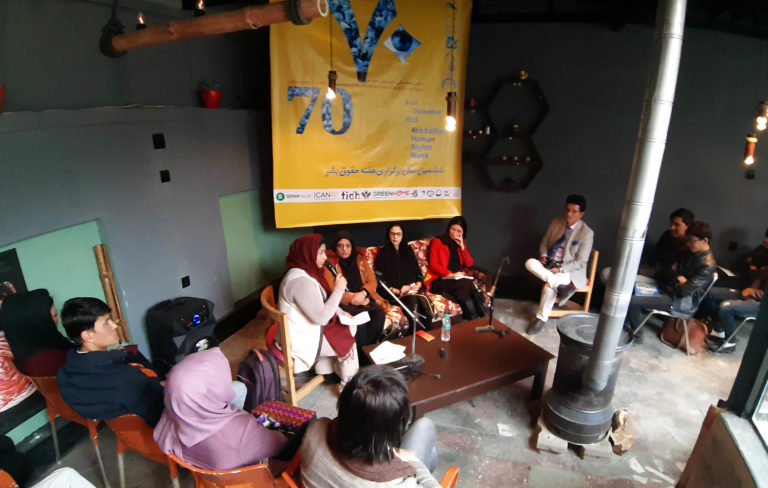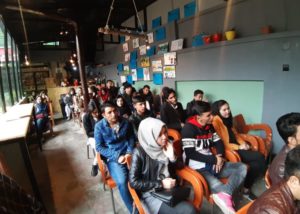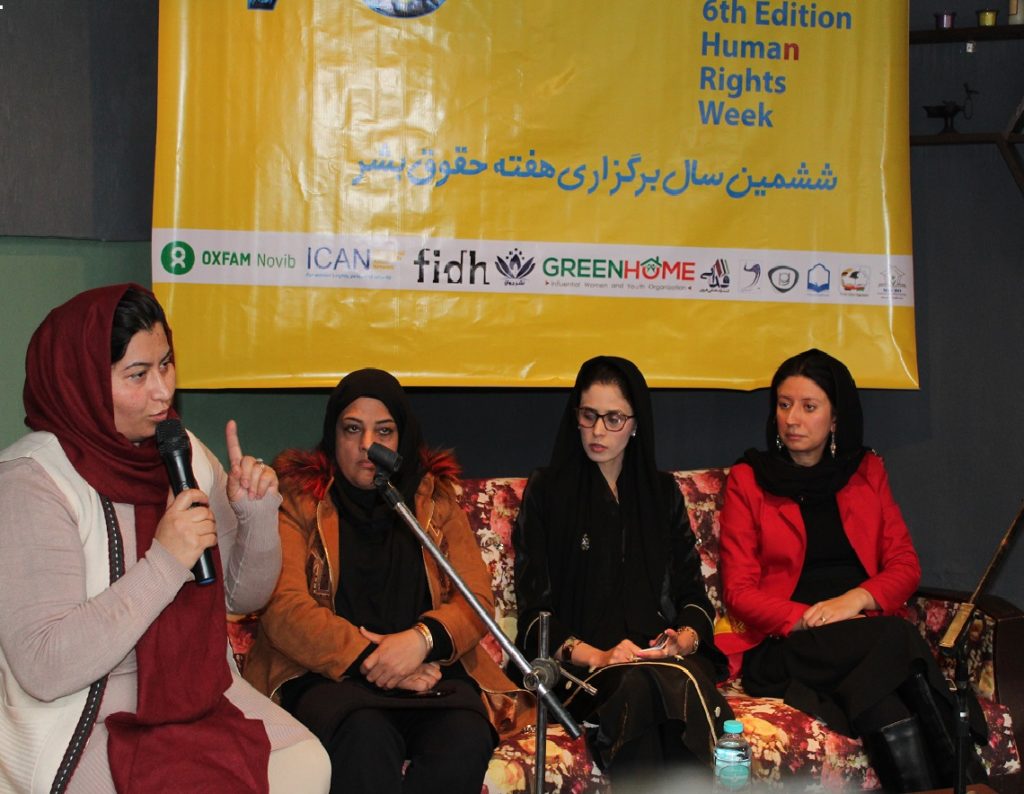
Armanshahr Foundation, in collaboration among others with Afghanistan Women’s News Agency, Afghanistan Development and Democracy Organisation and Book Café Cultural Centre, held a public dialogue conference with the title of “The hidden half: women build peace,” at the premises of Shahr-e Ketab Cultural Centre on Sunday, 9 December 2018.
Scores of civil rights activists, human rights and women’s rights defenders, cultural activists and students attended the conference. Ms Homeira Saqeb, chairperson of Afghanistan Women’s News Agency and moderator of the conference, had the following to say on the aim of the conference: “The public dialogue conference was organised to mark the Human Rights Week. Today’s conference was dedicated to women’s rights as an important topic of human rights.”
Ms Shahrzad Akbar, a political activist; Ms Manija Ramezi, professor of Kabul University, and Ms Najla Rahel, deputy president of the Bar Association of Afghanistan and board member of the Women’s Network, were the panellists at the conference.
Ms Shahrzad Akbar started by discussing peace and security:
“Experience has demonstrated that the government of Afghanistan commits itself to most international covenants and treaties, but it faces serious challenges in implementing them. There are several challenges: first, what happens if international obligations are in conflict with interpretations of religious issues and, in that case, which one is given priority? Second, the domestic institutions, government agencies, legislative and executive institutions do not possess the capacity to implement the obligations and the covenants. Third, there is a problem of political will. When and if there occasionally is a will to fulfil the international obligations, it is intended to leave a good impression on our international standing. However, the political will to implement them and to report on them regularly does not exist. Therefore, we are a state party to a number of international conventions, both regarding women as well as other issues such as cultural heritage, but we do not have a regular reporting procedure. Even if they have a plan of action, that plan is not really practicable and enforceable.
“To offset a pessimistic scenario regarding peace with the Taleban, which would include a change in the Constitution and restricting freedom of women including urban women in Afghanistan, the Taleban must be notified that Afghanistan has changed and their era is over.
“It is very important for jurist women, abreast of political and legal issues as well as religious issues and various interpretations of religion, to be present at the negotiations table. Women can strongly represent women’s issues and act as a third force, as people who were never directly involved in conflicts nor directly and extensively in political corruption, and be a voice of women, of young people, of media; a voice for individual freedom, for human dignity and a dignified life for all citizens of Afghanistan. That is the reason why we must take a serious approach to implementation of Resolutions 1325, 1820 and 2106 of the United Nations Security Council. We have to ask the government and political parties to work for it. We must firmly demand the government that 50 percent of the negotiations team be women. We must also raise the demand with political parties to have a notable representation of women and young people as members of their boards, because the people who fought in previous wars are not the only ones capable of building a bright future for Afghanistan. This is a joint task.”

Professor Manija Ramezi of Kabul University provided an assessment of the work of the 16th Parliament on women’s rights. She said: “There are three viewpoints regarding the work of the Parliament: first, of the common people; second, of Members of Parliament from within it; third, of civil rights and human rights activists and academics.
“The common people view the Parliament of Afghanistan, in particular the presence and role of women, to be symbolic. However, women MPs view their work positively and are proud of it. On the other hand, civil rights and women’s rights activists are mostly of the opinion that women MPs, who constitute 25 percent of the total number of MPs, can be divided into three groups: the vocal MPs, the vocal and active MPs, and the non-vocal and non-active MPs, who were the majority and were affiliated to influential persons and would occasionally sign the entry registration book.
In Ms Ramezi’s opinion, women Members of Parliament in Afghanistan have badly failed to establish extensive relations with other women in large cities. And one of the reasons for their failure within the Parliament has been a lack of coherence in their activities, which has led to their absorption into male ethnic groups, e.g. the Hazara, the Tajik and the Pashtun groups.
While women MPs usually report the adoption of the Law for Prohibition of Violence against Women as one of their achievements in Parliament, Ms Ramezi did not share this belief. According to her, the said law was adopted as a result of pressures and advocacy by women, civil rights and human rights activists, who adamantly endeavoured for its adoption, and managed to have it adopted by decree; that cannot be an achievement of female MPs. Nevertheless, she believed that women’s presence in Parliament cannot be overlooked as a starting point of women’s political participation, and she expressed hope that the shortcomings and deficiencies of the previous Parliament would be resolved in the next term of Parliament through the election of new MPs.
Ms Najla Rahel was the third speaker, who said: “we are very rich as far as the number of our laws is concerned. What we do not have is implementation of the laws. 22 crimes have been identified in the Law for Prohibition of Violence against Women. Women’s issues are assigned to special prosecutors and courts and all the cases are investigated under the penal code procedure. Article 6 of the law has allowed women to have lawyers and that can be very useful for women.
“The rate of violence is higher than what the media report. There are many cases of silent violence, which have not been identified at all, in particular sexual harassment and violence. Even though we have this law now, perhaps up to 90 percent of women in Afghanistan quietly tolerate that harassment. One of the factors behind violence is the prevalence of war in the country. War has brought poverty and poverty causes violence within families. Other factors are impunity enjoyed by bullies, illiteracy and poor rule of law.”
In conclusion, a number of participants asked questions to the panellists, who responded in turn.
After the conference, the newly published titles of Armanshahr were distributed among the participants, including Silence (an anthology of stories, Alice Munro), The Remains of the Day (Kazuo Ishiguro), The Land of Green Plums” (Herta Müller), My Ideal City (illustrated selection of drawings by children for the 5th International Simorgh Peace Prize). Armanshahr has printed and distributed more than 200,000 copies of different titles over several years.
Since 2013, Armanshahr Foundation has been organising the “Human Rights Week” at the beginning of December, marking the International Human Rights Day, by holding educational workshops, public conferences, cultural and artistic events with the aim of raising the capacity of civil society institutions and promoting the culture of respect for human rights. In the current year, the Human Rights Week was held in Kabul and Herat from 8-14 December 2018.


